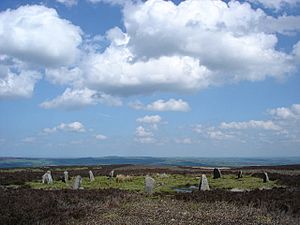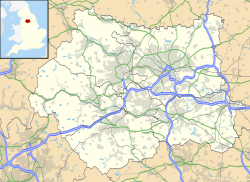Twelve Apostles, West Yorkshire facts for kids
 |
|
| Location | West Yorkshire |
|---|---|
| Coordinates | 53°54′06″N 1°48′34″W / 53.9016°N 1.809494°W |
| Type | Stone circle |
| History | |
| Periods | Bronze Age |
The Twelve Apostles is an ancient stone circle located near the towns of Ilkley and Burley in Wharfedale in West Yorkshire, England. This historic site is a fascinating glimpse into the past.
Where Are the Twelve Apostles Located?
This stone circle sits on Rombalds Moor, a large area of moorland between Ilkley Moor and Burley Moor. It is part of the area known as Burley in Wharfedale. The circle is found slightly below a ridge, about 381 metres (1,250 feet) above sea level. It is also not far from another stone circle called Grubstones, which is about 800 metres to the north-west.
What Do the Twelve Apostles Look Like?
The Twelve Apostles stone circle is about 15 metres (49 feet) wide. Originally, it probably had between 16 and 20 stones. Today, only 12 stones remain, which is how it got its name. The stones are made from a local rock called millstone grit.
In the mid-1900s, all the stones had fallen over and were lying on the ground. The circle also used to have a low bank around it, about 1.2 metres (4 feet) wide and 0.6 metres (2 feet) high. This bank has mostly worn away over time because many visitors walk around the site. In the middle of the circle, there was a small mound. Experts think this might have been the remains of an ancient burial cairn (a pile of stones marking a grave).
History of the Stones
In 1971, some people tried to stand the fallen stones back up, but they soon fell again. Later, the stones were re-erected, but it is not clear exactly when or by whom.
Today, the site is very popular with visitors. Because so many people walk there, the ground around the stones has become bare and trampled. The Twelve Apostles is considered one of the most damaged ancient sites in West Yorkshire due to this visitor erosion. It is important to visit such sites carefully to help protect them for the future.
 | Calvin Brent |
 | Walter T. Bailey |
 | Martha Cassell Thompson |
 | Alberta Jeannette Cassell |


